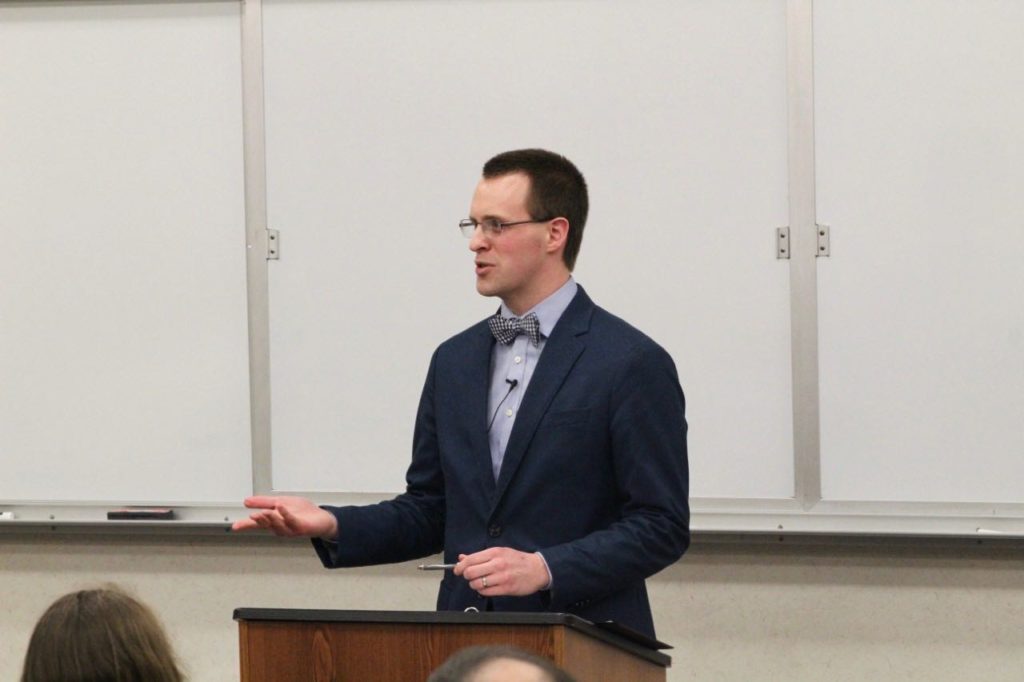
Despite Calvin Coolidge’s reputation for opposing progressive policy, he was actually sympathetic to it, Thomas Tacoma argued at his public lecture last Thursday.
Tacoma is Hillsdale College’s first student to earn a Ph.D. in the Van Andel program, who also graduated from the college.
In his dissertation, which was the first in the graduate program to receive honors, Tacoma argued Coolidge was “far more moderate of a Republican than most studies recognize.”
Tacoma said Coolidge’s political thought “turned out to be more broad, and more progressive” than Tacoma had expected, especially since Coolidge’s political actions are known for opposing progressives.
Tacoma said the writers who shaped Coolidge’s image were either progressive historians who “depicted him as a villainous embodiment of laissez-faire,” Republican supporters who “celebrated him as ‘Mr. Small Government,’” or admirers who “represented him as the direct heir of Abraham Lincoln and the founding fathers. ”
Tacoma’s dissertation challenges each of these views of Coolidge.
Tacoma claimed that “a more careful study of Coolidge’s political thought — one that relies more on his political ideas than what critics thought about him — reveals him both as a reformer with progressive sympathies, and a responsible statesman.”
Tacoma’s initial aim was to write about a figure or group of figures who represented constitutionalism in the progressive era.
“To some degree, I did retain that goal,” Tacoma said. “However, in my search for a suitable figure or group, I instead landed on Coolidge. My own focus shifted from constitutionalism narrowly conceived to Coolidge’s political thought broadly understood.”
Tacoma’s forty-minute presentation displayed the development of Coolidge’s political philosophy, or what he called “Coolidge’s philosophy of civilization.”
“Civilization for Coolidge meant order under the law of reason,” Tacoma said. “Coolidge believed religion and education provided the moral and mental discipline that improved the individual members of society and guided the political community away from danger.”
Moreover, Tacoma remarked that the cornerstone of Coolidge’s political thought was his optimism about human nature.
“In the face of growing employment, poverty, and misery, Coolidge held onto his conviction that the people were sound morally and spiritually, and that there was good reason to hope for better things in the future,” Tacoma said
According to Tacoma, Coolidge was thought of as a Republican progressive in his era.
“He had an interesting tension in his ideas about federalism,” Tacoma said. “He didn’t want the federal government to take on any new projects, but at the same time, he was open to the government having a bureau of education, or taking on problems of radio commission.”
Tacoma claimed that Coolidge “was taught to think of human societies in terms of civilization and the ethics of service, but he provides a different lens to look at these problems. His philosophy of civilization helps us to make sense of his interpretation of the American founding, of constitutional government in his own day, of his economic thought, and his views on foreign policy.”
Ronald Pestritto, Tacoma’s adviser and professor of politics, said the dissertation was superb because Tacoma’s research was thorough and his evidence was sound.
“Tom was willing to go where the evidence took him regardless of his professor’s views and his own inclinations on these questions,” he said. “That is what makes this a model dissertation.”
Freshman Eliana Kernodle remarked that she had been interested in Coolidge for a while, but nothing she had studied had revealed Coolidge as Tacoma had in his dissertation.
“I thought this was very interesting because it offered a nuanced view of his politics that I had not caught in the biography on Coolidge I read,” Kernodle said. “I learned that there was a lot more to him than the staunch conservative that biographers often portray him to be.”
Adam Carrington, a member of the dissertation committee and assistant professor of politics, said Tacoma “had it well-planned out and did a very good job of executing it.”
“It is probably one of the best dissertations we will work on, and that is why it was the first to receive honors,” Carrington said.

